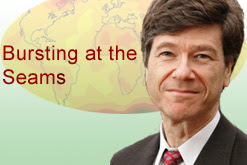Just a couple of days since the Immigration Minister, Liam Byrne, admitted that large-scale immigration has damaged our poorest communities, has deeply unsettled the country, and has resulted in inequality and child poverty, a new Civitas report reveals that immigration into Britain is now running at a level that is without precedent in our history and which threatens our cohesion as a nation.
Maintaining that immigration had never previously risen above very low levels or had any serious demographic impact prior to the last part of the twentieth century, the report's author, David Conway, claims that Labour's policies since 1997 have amounted to a virtual abandonment of the control of our borders, with net foreign immigration now representing an increase in Britain's population of one per cent every two years. He suggests:
"The country may possibly have already reached a tipping point beyond which it can no longer be said to contain a single nation. Should that point have been reached, then ironically, in the course of Britain having become a nation of immigrants, it would have ceased to be a nation. Once such a point is reached, political disintegration may be predicted to be not long in following."
Speaking earlier this week, the Immigration Minister cited the case of a school in his constituency where non-English speakers have soared from 1-in-20 to 1-in-5 in just a year and admitted, "It is true that a small number of schools have struggled to cope, that some local authorities have reported problems of overcrowding in private housing and that there have been cost pressures on English language training."
The new Australia-style points-based system that he revealed, restricting immigration to skilled workers (a
policy adopted from the Conservatives' 2005 election manifesto) and to be introduced next year, is long overdue. However, this will have
no impact on illegal immigrants or people coming from the European Union. Moreover, the Government still does not accept the need for a cap on how many migrants it allows into the country, so there is no reason to suppose that the new system will make any noticeable difference to our present laissez-faire migration.
If Britain is to remain a stable, free, and tolerant country, we need to recognise the extent to which Tony Blair's leadership of this country has radically and irreversibly transformed the face of our communities. Further, if we are to hold society together, we need to realise that the
dialogue of civilisations is not merely an exercise to be carried out
between nations but is now a requirement
within our nation. Lastly, if we are truly to get a grip on this issue, we also need to reclaim full control of our borders from Europe – something that Blair's commitment yesterday to finalise a "
basic outline agreement for a treaty" at June's European summit will not facilitate.



![Istanbul Rally [Screenshot from BBC News]](https://blogger.googleusercontent.com/img/b/R29vZ2xl/AVvXsEiY-i2VF8sur0_zqwrTou6JLiudshphXDmapCtUyor6Ihj8c1W2tgqE7IrAwHN42DIUkB_wT0y3P0ieAuv-72m8kHdSZsfINgAJXIG8pr9wzmxwp2nCctVvq35zCkZ5g_iwFXbTzO6Iympr/s320/turkeyrally.JPG) This blog has raised various concerns about events in
This blog has raised various concerns about events in  The outgoing prime minister is of course right no longer to agree with "the Blair of 1992" who believed that investment alone would deal with the "small and unrepresentative minority" of trouble-makers. However, he still fails to understand "the Cameron of 2007" and also seems not to recognise that the decisions he has been responsible for taking during his ten years in power have exacerbated the general social malaise through his consistent and deliberate destruction of our country's historic local and national institutions, from the family, through local councils, to Parliament itself.
The outgoing prime minister is of course right no longer to agree with "the Blair of 1992" who believed that investment alone would deal with the "small and unrepresentative minority" of trouble-makers. However, he still fails to understand "the Cameron of 2007" and also seems not to recognise that the decisions he has been responsible for taking during his ten years in power have exacerbated the general social malaise through his consistent and deliberate destruction of our country's historic local and national institutions, from the family, through local councils, to Parliament itself. Ahead of tomorrow's
Ahead of tomorrow's  In a new book due out on Monday, At the Center of the Storm, America's former director of central intelligence, George Tenet, has accused Vice President Dick Cheney and other Bush administration officials of pushing the country to war in Iraq without ever conducting a "serious debate" about whether Saddam Hussein posed an imminent threat to the United States or about the possibility of containing Iraq without an invasion. He now fears that US forces are becoming increasingly irrelevant to the management of sectarian violence in Iraq and questions the wisdom of Bush's "surge" strategy.
In a new book due out on Monday, At the Center of the Storm, America's former director of central intelligence, George Tenet, has accused Vice President Dick Cheney and other Bush administration officials of pushing the country to war in Iraq without ever conducting a "serious debate" about whether Saddam Hussein posed an imminent threat to the United States or about the possibility of containing Iraq without an invasion. He now fears that US forces are becoming increasingly irrelevant to the management of sectarian violence in Iraq and questions the wisdom of Bush's "surge" strategy.![Britain and America [Credit: ConHome]](https://blogger.googleusercontent.com/img/b/R29vZ2xl/AVvXsEhElKE-VxHgzIB8K9nfMcSeZF1bJej8zM8q0ubJ4_SaKovnpXwbyGrugHAoYArpAJtmmyTcrhLrrc9zMCxdhMNLLDN5brJlk63udiGc3q-3hs8YG51n7GgzdGy24TzG3-useKXt0E3No1I1/s320/britain_and_america.jpg) Yesterday should have been a good day in British-American relations.
Yesterday should have been a good day in British-American relations. Finally, yesterday, the Home Office Minister, Baroness Scotland, and US Ambassador, Robert Tuttle, exchanged the Instruments of Ratification at a ceremony in London. However, the treaty remains unbalanced in that if the UK wishes an American citizen to be extradited to Britain, we must submit evidence for an American court to decide whether or not to proceed, whereas America simply has to present an outline of the alleged crime to force a Briton to stand trial in the US.
Finally, yesterday, the Home Office Minister, Baroness Scotland, and US Ambassador, Robert Tuttle, exchanged the Instruments of Ratification at a ceremony in London. However, the treaty remains unbalanced in that if the UK wishes an American citizen to be extradited to Britain, we must submit evidence for an American court to decide whether or not to proceed, whereas America simply has to present an outline of the alleged crime to force a Briton to stand trial in the US.
 These statistics, obtained by Conservative MP Grant Shapps under a Freedom of Information Act request, paint a worrying picture and fill in significant missing details in the wider portrait of the
These statistics, obtained by Conservative MP Grant Shapps under a Freedom of Information Act request, paint a worrying picture and fill in significant missing details in the wider portrait of the  This civilisational dialogue is usually thought of in the context of Muslim-Christian and Muslim-Western secular relations. However, another often forgotten but crucial dimension is Jewish-Muslim relations. In a new development, Jewish and Muslim organisations met together last week in Brussels and discussed questions such as those listed at the beginning at this post. They also compiled information on partnerships, initiatives and best practice in the field of Jewish-Muslim dialogue in Europe.
This civilisational dialogue is usually thought of in the context of Muslim-Christian and Muslim-Western secular relations. However, another often forgotten but crucial dimension is Jewish-Muslim relations. In a new development, Jewish and Muslim organisations met together last week in Brussels and discussed questions such as those listed at the beginning at this post. They also compiled information on partnerships, initiatives and best practice in the field of Jewish-Muslim dialogue in Europe. We found Iranians to be extremely open, significantly more so even than elsewhere in Central Asia, constantly welcoming us as they passed in the street and stopping to talk – our favourite greeting was the cyclist who yelled the above quote at us as he raced past us.
We found Iranians to be extremely open, significantly more so even than elsewhere in Central Asia, constantly welcoming us as they passed in the street and stopping to talk – our favourite greeting was the cyclist who yelled the above quote at us as he raced past us. Conservative leader David Cameron has told Radio 4's Today programme that measures like
Conservative leader David Cameron has told Radio 4's Today programme that measures like 

![Night-vision view of the site where the wall is being built, courtesy of the US military [Credit: BBC]](http://newsimg.bbc.co.uk/media/images/42829000/jpg/_42829781_building_body_usmilitary.jpg)
!['Storm of the Century' - 13 March 1993 [Credit: NASA]](https://blogger.googleusercontent.com/img/b/R29vZ2xl/AVvXsEgSrgLY3moNQ2hyphenhyphenXOyqC0UupfaZMDCA58izlR_1AiUeQ3oRfu57ojttkatLiFsHa0y_IJlR9DohpxqFE40JljRN4qRBAOR9JDwoWGzffL_sSJXI2h1dx-o-HuEeg11R6y-l_0Cx-AjUmEiL/s320/Superstorm.gif)
![Mohammed Samad reunited with his wife and son [Credit: The Argus]](https://blogger.googleusercontent.com/img/b/R29vZ2xl/AVvXsEiDzX3C8F3Bf-lrypkMICgm5jKXt8nVOk0q2Hu-LrgM5HDDRv6YYMPm5JukoH9dB7BkAkFyWOKpaBuZYNtA6yo4wURPszK30-UB5juCygbWT877F9XwdXvSSkqm61cTwJ_AtMxI_bYUtj3Z/s320/Samad.jpg)
 If someone mentions St George, what do you think of?
If someone mentions St George, what do you think of? The American Army already deploys robot soldiers in Iraq. Equipped with tank tracks and automatic weapons, these robotic units, known as SWORDS (Special Weapons Observation Reconnaissance Detection Systems), allow humans to attack the enemy by remote control.
The American Army already deploys robot soldiers in Iraq. Equipped with tank tracks and automatic weapons, these robotic units, known as SWORDS (Special Weapons Observation Reconnaissance Detection Systems), allow humans to attack the enemy by remote control.![Kilimanjaro's northern glaciers [Credit: Peter Haynes]](https://blogger.googleusercontent.com/img/b/R29vZ2xl/AVvXsEgWHl4qd7QfqquqdLQQ1fZIUXUnoHIEgekmIzM7LZLUyb7Zr-G2k0L7mYVVwVHAQD3ACm4otInNdcOJVPz6PLA_BqRxP2MYPhbvxEzNxWFaqhfc2wXZ3ffTpCKcu4HAHeBb5MskmP3Q-SFB/s320/kilimanjaro-glaciers.jpg) So a team of scientists from the University of Innsbruck have told the European Geosciences Union General Assembly.
So a team of scientists from the University of Innsbruck have told the European Geosciences Union General Assembly.
 In Russia, however, you could find the police knocking on your door. On 15th February, 21-year-old Savva Terentyev left a comment on the blog of his local journalist,
In Russia, however, you could find the police knocking on your door. On 15th February, 21-year-old Savva Terentyev left a comment on the blog of his local journalist,  An average of just 30 pence in every pound of foreign aid increases to Sub-Saharan African countries can be spent because the International Monetary Fund requires governments under its supervision to redirect the use of foreign aid increases to either boost international currency reserves or to pay down domestic debt.
An average of just 30 pence in every pound of foreign aid increases to Sub-Saharan African countries can be spent because the International Monetary Fund requires governments under its supervision to redirect the use of foreign aid increases to either boost international currency reserves or to pay down domestic debt. So concluded Professor Jeffrey Sachs in the first of this year's
So concluded Professor Jeffrey Sachs in the first of this year's 
